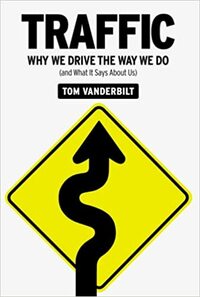You need to sign in or sign up before continuing.
Take a photo of a barcode or cover
I am glad I read this book (or more accurately, listened to it while sitting in traffic, which was indeed a strange, almost out-of-body experience as the reader called out mistakes and assumptions I make as a driver while I was making them. I highly recommend reading the book this way). Despite the large amount of freedom riders driving across the seemingly empty pages of this great nation, Vanderbilt indicates that many a driver is a stranger to himself, acting and reacting in ways that may seem normal or safe, but actually cause the ills and congestion of traffic. And every mother's son, (including John Barleycorn), is a victim of traffic.
The book is filled to the brim with interesting statistics and factoids, so let me just provide a smattering of the ideas that I found most interesting:
-Parking spots are too cheap and too plentiful in U.S. cities, and thus encouraging more people to drive instead of walking or biking or using transit, causing more traffic.
-As cities expand outward into suburbs, public transit has trouble reaching people, thus causing people to drive more often, thus causing fewer people to use public transit, thus driving up public transit prices, thus causing even fewer people to use public transit, thus causing more traffic.
-Bicyclists are actually safer riding on the street than on the sidewalk, even though sidewalks feel safer.
-Men are almost twice as likely to get into fatal car crashes, but women are more likely than men to get into nonfatal car crashes.
-Truck and SUV drivers speed and drive more aggressively for a multitude of reasons. They feel safer within their vehicles, and their positions high above the road make it look (to their eyes) like they are moving more slowly.
-Roundabouts are far safer than traffic light intersections.
I could go on and on, which is actually one of the weaknesses of this book. It's so dense with information, and its thesis is so broad that it is hard to synthesize all these statistics after having listened to it. What should I take away from it? Is there more I could be doing to change laws and regulations to make traffic safer and less congested? Or should I just stop driving altogether? Still, the tidbits I picked up and some of the statistics expanded upon have made me more cautious and more aware of my surroundings as a driver. If nothing else, this book will make you safer and more observant on the road, and there is certainly nothing wrong with that.
The book is filled to the brim with interesting statistics and factoids, so let me just provide a smattering of the ideas that I found most interesting:
-Parking spots are too cheap and too plentiful in U.S. cities, and thus encouraging more people to drive instead of walking or biking or using transit, causing more traffic.
-As cities expand outward into suburbs, public transit has trouble reaching people, thus causing people to drive more often, thus causing fewer people to use public transit, thus driving up public transit prices, thus causing even fewer people to use public transit, thus causing more traffic.
-Bicyclists are actually safer riding on the street than on the sidewalk, even though sidewalks feel safer.
-Men are almost twice as likely to get into fatal car crashes, but women are more likely than men to get into nonfatal car crashes.
-Truck and SUV drivers speed and drive more aggressively for a multitude of reasons. They feel safer within their vehicles, and their positions high above the road make it look (to their eyes) like they are moving more slowly.
-Roundabouts are far safer than traffic light intersections.
I could go on and on, which is actually one of the weaknesses of this book. It's so dense with information, and its thesis is so broad that it is hard to synthesize all these statistics after having listened to it. What should I take away from it? Is there more I could be doing to change laws and regulations to make traffic safer and less congested? Or should I just stop driving altogether? Still, the tidbits I picked up and some of the statistics expanded upon have made me more cautious and more aware of my surroundings as a driver. If nothing else, this book will make you safer and more observant on the road, and there is certainly nothing wrong with that.
challenging
informative
medium-paced
This was a fun and interesting book club pick. It differed from our normal reads. I liked it because it seemed well researched and provoked thought. I'm not convinced of some of the conclusions, like that we don't need traffic signs, but I was intrigued. Perversely, this made me feel a little better about driving because I'm a real nervous driver, an issue the book doesn't really cover, but it said people are apt to drive worse the more confident and safe they believe themselves to be. I never feel safe, I never feel confident, sometimes just reading about traffic gave me a small anxiety attack.
Eminently readable, full of fun research...and yet I didn't finish it. My brain is not in non-fiction mode right now.
Traffic, I really wanted to like you. We just don't mesh well. I felt like this book had a great deal of potential but I got about 125 pages in and put it down.
a custom-made book for urbanists like russell preston
Traffic is a fascinating topic, and I had been wanting to read this book for some time before I encountered it on clearance at B&N. There's a lot of psychology to this, and how different factors can affect our driving. The most interesting part for me was the description of how things such as the width of lanes, location of sidewalks, and number of signs can affect traffic safety. The central lesson from this book is that the safer you feel, the riskier you will behave. Driving in conditions that feel riskier causes you to be more attentive. That's awesome stuff!
My only issue with the book was that, like several nonfiction pop-sciencey books I've read, it didn't feel focused. I loved the various examples, but their variety made it difficult to discover the central point of each chapter. I'm a big fan of section titles--cue me to what you are trying to say!--and the lack thereof was sorely felt. And because it was hard to keep with the general argument, as fascinating as the examples were, they were easily forgotten. They had little cohesiveness.
My only issue with the book was that, like several nonfiction pop-sciencey books I've read, it didn't feel focused. I loved the various examples, but their variety made it difficult to discover the central point of each chapter. I'm a big fan of section titles--cue me to what you are trying to say!--and the lack thereof was sorely felt. And because it was hard to keep with the general argument, as fascinating as the examples were, they were easily forgotten. They had little cohesiveness.
I tried to like Traffic but it was just too poorly written. For example, some of the descriptions of road situations were very difficult to understand. Hasn't the author heard of diagrams? Would've been a much easier read with diagrams. The author also failed to address some basic issues and instead suggested some very questionable ideas with only anecdotal support.
Excellent book, I mention it nearly every time I'm in a car. It really gave me some interesting perspectives on the psychology of driving and drivers.
challenging
informative
mysterious
slow-paced
What Omnivore's Dilemma is to eating, Traffic is to driving. It has shaped and informed my thoughts about the road and the vehicles on it. I highly recommend you at least skim through it.







